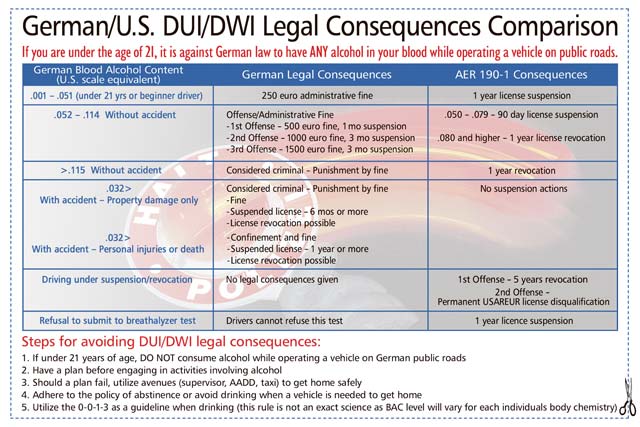German law prohibits people under the age of 21 to operate a vehicle with any alcohol in their system, and people older than 21 can’t have more than .05 percent in their system under normal circumstances and .03 percent if involved in traffic offenses or accidents.
German and U.S. authorities report blood alcohol tests differently. German law uses milligrams per milliliters. U.S. law uses grams per 100 milliliters. For example, a .5 BAT in Germany would be a 0.05 BAT in the U.S.
If a driver’s BAT is .5, the German authorities will normally suspend a license for one month and assess a €250 fine. However, Air Force authorities will automatically revoke driving privileges for one year.
If an accident occurs or there is other evidence of functional defects in a person’s driving resembling repeatedly swerving or crossing the center line, the German authorities reduce the legal BAT to .3. With this charge, motorists could receive a criminal fine ranging from several hundred euro to more than €1,000 depending on the individual’s income. In some cases, jail time is possible.
Motorists can take several steps to make sure they do not get charged with driving under the influence or driving while intoxicated.
Some of these steps include:
• Adhere to the policy of abstinence; avoid drinking when a vehicle is needed to get back to the place of residence.
• Have a plan before engaging in drinking outside of home. Preselect a designated driver and hold them accountable; trust, but verify, the individual has not consumed alcohol.
• Should the plan fail, use resources available to get you home safely. Some options include a taxi, Airmen Against Drunk Driving or a supervisor.
• Use the 0-0-1-3 (zero alcohol-related incidents, zero DUIs, one drink per hour, three drinks per night) as a guideline when drinking. This rule is not an exact science as a BAC level will depend on the individual’s body chemistry.



